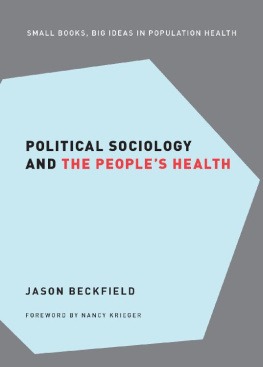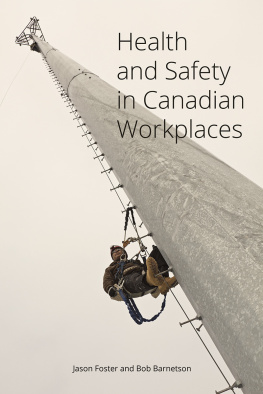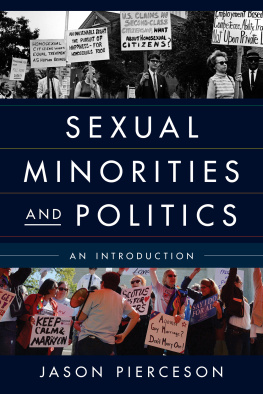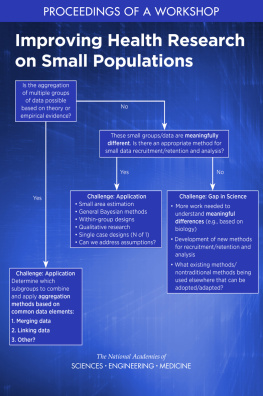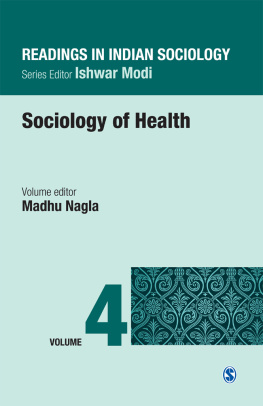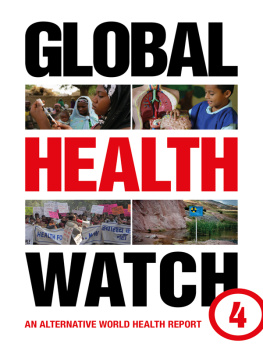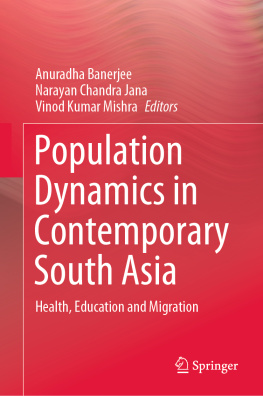Jason Beckfield - Political Sociology and the Peoples Health (Small Books Big Ideas in Population Heal)
Here you can read online Jason Beckfield - Political Sociology and the Peoples Health (Small Books Big Ideas in Population Heal) full text of the book (entire story) in english for free. Download pdf and epub, get meaning, cover and reviews about this ebook. year: 2018, publisher: Oxford University Press, genre: Politics. Description of the work, (preface) as well as reviews are available. Best literature library LitArk.com created for fans of good reading and offers a wide selection of genres:
Romance novel
Science fiction
Adventure
Detective
Science
History
Home and family
Prose
Art
Politics
Computer
Non-fiction
Religion
Business
Children
Humor
Choose a favorite category and find really read worthwhile books. Enjoy immersion in the world of imagination, feel the emotions of the characters or learn something new for yourself, make an fascinating discovery.
- Book:Political Sociology and the Peoples Health (Small Books Big Ideas in Population Heal)
- Author:
- Publisher:Oxford University Press
- Genre:
- Year:2018
- Rating:3 / 5
- Favourites:Add to favourites
- Your mark:
- 60
- 1
- 2
- 3
- 4
- 5
Political Sociology and the Peoples Health (Small Books Big Ideas in Population Heal): summary, description and annotation
We offer to read an annotation, description, summary or preface (depends on what the author of the book "Political Sociology and the Peoples Health (Small Books Big Ideas in Population Heal)" wrote himself). If you haven't found the necessary information about the book — write in the comments, we will try to find it.
Jason Beckfield: author's other books
Who wrote Political Sociology and the Peoples Health (Small Books Big Ideas in Population Heal)? Find out the surname, the name of the author of the book and a list of all author's works by series.
Political Sociology and the Peoples Health (Small Books Big Ideas in Population Heal) — read online for free the complete book (whole text) full work
Below is the text of the book, divided by pages. System saving the place of the last page read, allows you to conveniently read the book "Political Sociology and the Peoples Health (Small Books Big Ideas in Population Heal)" online for free, without having to search again every time where you left off. Put a bookmark, and you can go to the page where you finished reading at any time.
Font size:
Interval:
Bookmark:
Series Editor
Nancy Krieger
1. J. Beckfield. Political Sociology and the Peoples Health
Jason Beckfield
PROFESSOR AND CHAIR OF
SOCIOLOGY
HARVARD UNIVERSITY
ASSOCIATE DIRECTOR O F
THE HARVARD CENTER FOR
POPULATION AND DEVELOPMENT
STUDIES


Oxford University Press is a department of the University of Oxford. It furthers the Universitys objective of excellence in research, scholarship, and education by publishing worldwide. Oxford is a registered trade mark of Oxford University Press in the UK and certain other countries.
Published in the United States of America by Oxford University Press
198 Madison Avenue, New York, NY 10016, United States of America.
Oxford University Press 2018
All rights reserved. No part of this publication may be reproduced, stored in a retrieval system, or transmitted, in any form or by any means, without the prior permission in writing of Oxford University Press, or as expressly permitted by law, by license, or under terms agreed with the appropriate reproduction rights organization. Inquiries concerning reproduction outside the scope of the above should be sent to the Rights Department, Oxford University Press, at the address above.
You must not circulate this work in any other form and you must impose this same condition on any acquirer.
CIP data is on file at the Library of Congress
ISBN 9780190492472
eISBN 9780190492496
This material is not intended to be, and should not be considered, a substitute for medical or other professional advice. Treatment for the conditions described in this material is highly dependent on the individual circumstances. And, while this material is designed to offer accurate information with respect to the subject matter covered and to be current as of the time it was written, research and knowledge about medical and health issues is constantly evolving and dose schedules for medications are being revised continually, with new side effects recognized and accounted for regularly. Readers must therefore always check the product information and clinical procedures with the most up-to-date published product information and data sheets provided by the manufacturers and the most recent codes of conduct and safety regulation. The publisher and the authors make no representations or warranties to readers, express or implied, as to the accuracy or completeness of this material. Without limiting the foregoing, the publisher and the authors make no representations or warranties as to the accuracy or efficacy of the drug dosages mentioned in the material. The authors and the publisher do not accept, and expressly disclaim, any responsibility for any liability, loss or risk that may be claimed or incurred as a consequence of the use and/or application of any of the contents of this material.
Oxford University Press is not responsible for any websites (or their content) referred to in this book that are not owned or controlled by the publisher.
Nancy Krieger
For the Peoples HealthWhy this Book Series of Small Books with Big Ideas
Nancy Krieger
Several years ago, when I first conceived of this series of small books with big ideas to expand social epidemiologys contributions to the ongoing collective quest for health equity, I knew that more critical dialogue was neededboth within the discipline and with allied disciplines, inside and outside the field of public health. Concise texts provide an ideal forum in which to present this type of critical thinking: provocative, probing, longer than a journal article, shorter than a tome, affordable, and accessible for assigning as reading material for academic courses. The point of this series is to make sharp ideas attractively available, motivated by the urgent need for both critical thinking and action for the peoples health.
Why? Three reasons.
The first reason, internal to the field, is that as a discipline matures, it risks becoming set in its ways. It is thus timely to revisit the fields ideas, methods, and evidence, and to search out allies who can both inform the ideas that feed the hypotheses and data that social epidemiologists analyze and interpret, and also translate our fields findings into actionable steps for reducing health inequities and improving population health. Among the initial array of topics to be addressed in this series are connections between social epidemiology and diverse disciplines (e.g., political sociology, Latin American social medicine), issues (e.g., climate change, causal inference), and mechanisms (e.g., epigenetics)and the list will expand.
A second reason is that fast-moving transformationssuch as global climate changeare threatening the well-being of life on this planet in truly new and potentially catastrophic ways.
The third reason is that social epidemiology, as a discipline, needs to be clear on who and what are the adversaries that stand in the way of eradicating health inequities. It is not enough, for example, to provide empirical evidence that, say, egalitarian and environmentally sustainable policies promote both health equity and population health. After all, at one level, such evidence should be in the proverbial American Mom and apple pie category of phenomena: who could possibly oppose such a seemingly beneficent and anodyne recommendation?
Except that clearly many can and dobecause if the arguments for health equity were as compelling as many in social epidemiology would like to believe, all of us on this planet would be living in a very different, healthier, and more equitable world, one not imperiled by environmental degradation, climate change, and the avaricious private accumulation of more and more wealth by an ever smaller portion of the worlds people, and its effect on local, national, and global governance and population health.
Last year saw the biggest increase in the number of billionaires in history, with one more billionaire every two days. There are now 2,043 dollar billionaires worldwide. Nine out of 10 are men. Billionaires also saw a huge increase in their wealth. This increase was enough to end extreme poverty seven times over. Eighty-two percent of all of the growth in global wealth in the last year went to the top 1%, whereas the bottom 50% saw no increase at all.
In the United States, as I write this introduction in February 2018, we confront a federal administration intent on dismantling environmental regulations and instead protecting and expanding the fossil fuel industries; slashing taxes and regulations for corporations and shrinking taxes for wealthy households, while decimating agencies and funding for social programs that help people live healthier lives; undercutting civil rights and attacking independent journalism, the rule of law, and scientific evidence; intensifying anti-immigrant policies and attacks on reproductive and sexual rights and healthall policies bolstered by a president whose endless tweets are a unique brand of ceaseless demagoguery, falsehoods, racism, misogyny, and disdain for actual knowledge. To make a difference, we in public health, including social epidemiology, need to be explicit about naming who and what harms the peoples health, so as to promote accountability and alliances to galvanize change.
Font size:
Interval:
Bookmark:
Similar books «Political Sociology and the Peoples Health (Small Books Big Ideas in Population Heal)»
Look at similar books to Political Sociology and the Peoples Health (Small Books Big Ideas in Population Heal). We have selected literature similar in name and meaning in the hope of providing readers with more options to find new, interesting, not yet read works.
Discussion, reviews of the book Political Sociology and the Peoples Health (Small Books Big Ideas in Population Heal) and just readers' own opinions. Leave your comments, write what you think about the work, its meaning or the main characters. Specify what exactly you liked and what you didn't like, and why you think so.

